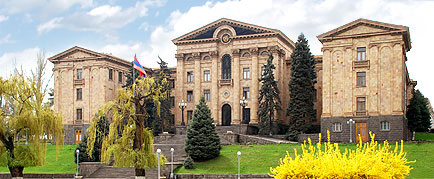links with the European Union and the Council of Europe, harmonization of laws of the Republic of Armenia with European legislation
| 29.01.2008 |
|
Mr ADONTS (Armenia) . – I thank Mr Popescu for doing an excellent job. Transfrontier co-operation is an issue of great importance, especially in terms of integrating Europe. Territories that are located on the borders of two or more countries face many challenges because of their location. From this perspective, transfrontier co-operation projects are crucial, as they provide a more efficient infrastructure and enable better environmental, transport, health and labour policies. Such projects also strengthen partnerships and communication between different communities that, due to their location, usually share the same problems and challenges. In the light of the recent enlargement of the EU and the European neighbourhood policy initiative, new and innovative approaches and pioneering projects are required, not only within the EU borders but in the territories on the periphery. The rapporteur rightly stresses the need to diminish so-called “border effects”, such as institutional, administrative, cultural, ethnic and, often, political obstacles. As transfrontier co-operation initiatives have evolved from the twinning of villages and towns into regional projects, there is a need for new and innovative approaches, especially where those regions involve conflicts or tensions. Such projects are crucial in terms of their potential for confidence building. Euro-region or Euro-district-like models can be experimented with in regions where conflict exists. Once established, they may prove themselves to be important instruments for conflict settlement. The border areas, which usually suffer most from such conflicts, may be transformed into the protagonists of peace, stability, dialogue or co-operation. In order to make these projects a reality, new approaches have to be designed, based on the experience of various ongoing border projects in Europe. Observation, planning, training and co-operation are needed more than ever – for example, in regions like the South Caucasus, where there is a lack of experience and a need for guidance to help. We reiterate Mr Popescu’s call to establish appropriate national legal instruments in order to promote transfrontier co-operation. In fact, the Madrid Outline Convention provides the necessary legal basis for that. However, national authorities should refrain from expressing any reservations that are destabilising and destructive, as a refusal to co-operate simply cannot be justified. By promoting regional co-operation and confidence-building measures, transfrontier interaction can only foster conflict resolution, but in no case should such co-operation be conditional on conflict resolution. Our group welcomes such activities on the part of the Council of Europe and the EU. They are aimed at drafting a new convention that would establish Euro-regional co-operation groupings, and provide the legal basis to allow non-EU member countries to participate in European groupings of territorial co-operation. Ongoing projects in several parts of Europe can serve as a palette whereby such experiences can be combined and new elements incorporated, enabling such projects to be used effectively in regions. They could generate results that have not even been anticipated. My group and I welcome the report and greatly appreciate Mr Popescu’s efforts.Verbatim records of January 25 session in full are available on the PACE website |




